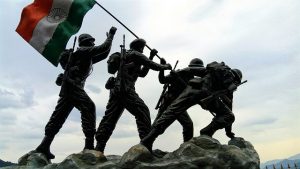NO2 最新!「なぜ今も続く?」インド・パキスタン紛争の行方と日本で学ぶ留学生の声
 イメージ
イメージ
【2025年最新】
「なぜ今も続く?」インド・パキスタン紛争の行方と日本で学ぶ留学生の声
世界には長年続く対立が存在します。
その中でもインドとパキスタンの対立は、
70年以上にわたり解決の糸口を見つけられずにきました。
2025年現在も両国は緊張関係にあり、
「なぜ今戦うのか?」という問いが改めて投げかけられています。
インド・パキスタン紛争の現在(2025年時点)
カシミールをめぐる対立
2019年、インド政府は「ジャンムー・カシミール州の特別自治権」を撤廃し、
中央政府直轄地としました。
これに対しパキスタンは強く反発し、両国関係はさらに冷え込みました。
国境での衝突とテロ事件
印パ国境では断続的に銃撃戦やテロ事件が発生し、
民間人が犠牲になるケースも後を絶ちません。
国内事情が対立を強化
パキスタン:深刻な経済危機と政治不安の中、政府は強硬姿勢で
国民の結束を図っています。
インド:経済成長を続ける一方でナショナリズム(ヒンドゥー至上主義)が
高まり、対パキスタン強硬路線が国民の支持を得ています。
島国・日本から見た国境問題
日本は四方を海に囲まれ、国境問題の現実的なリスクは少ない国です。
しかし、もし日本が韓国や中国と地続きだったとしたらどうでしょう。
徴兵制度が残り、軍需産業が主要産業となっていた可能性すら考えられます。
そう考えると、印パの緊張関係は決して遠い世界の出来事ではありません。
今後の展開シナリオ
1,限定的な衝突の継続(可能性が高い)
小規模な軍事衝突やテロは今後も続くと予想されます。
ただし両国が核兵器を保有しているため、大規模戦争には発展しにくいと見られています。
2,国際社会の介入
アメリカや中国、ロシア、中東諸国などが仲裁役として介入する可能性があります。
特に、中国はパキスタンとの同盟関係を重視し、
インドはアメリカとの戦略的パートナーシップを深めています。
3,和平の可能性(低いが存在)
経済発展や社会安定が両国共通の優先課題であるため、
経済協力や人的交流が増えれば緊張緩和につながる可能性もあります。
 イメージ
イメージ
留学生の問いかけ「なぜ人は戦争するの?」
ある日、日本で学ぶパキスタンの女子留学生に問いかけられました。
「なぜ人は戦争するの?」
私は「領土・民族・宗教」という三つの要素を説明しましたが、
彼女は納得できない様子で静かに考え込んでいました。
第二次世界大戦で敗北を経験した日本人として、
何か意味ある答えを示したかったのですが、
言葉が足りなかったのだと感じています。
市民が望むのは「平和と安定」
インド側の声
都市部の若者やIT・ビジネス分野で働く人々は「戦争より国際交流を」と望んでいます。
「敵国ではなく隣人としてパキスタンを見たい」という意見も出ています。
パキスタン側の声
経済危機と失業問題を背景に、多くの国民は「戦争より生活の安定」を求めています。
インドとの貿易再開や文化交流を期待する声も少なくありません。
 イメージ
イメージ
世界的に広がる不安と願い
世界では地域紛争が止む気配を見せず、
むしろ「第三次世界大戦の可能性」がネット上で語られるほどです。
しかし、私たちが本当に望むのは逆であり、
小さな対立を拡大させないための努力です。
「なぜ今、戦うのか?」――
その問いに明確な答えを見つけることは難しいでしょう。
けれども、平和を求める市民の声が無視されない未来を、
私たちは切に願わざるを得ません。
 image
image
[Latest 2025 Report]
“Why does it still continue?” —
The Outlook of the India-Pakistan Conflict and
Voices from International Students in Japan
There are conflicts in the world that have lasted for decades.
Among them,
the confrontation between India and Pakistan
has persisted for more than 70 years
without finding a resolution.
As of 2025, tensions between the two countries remain high,
raising the question once again:
“Why are they still fighting?”
The India-Pakistan Conflict Today (as of 2025)
The Dispute over Kashmir
In 2019, the Indian government revoked
the “special autonomous status of Jammu and Kashmir” and
placed the region under direct federal control.
Pakistan strongly opposed this move,
and relations between the two countries further deteriorated.
Border Clashes and Terrorist Incidents
Along the India-Pakistan border, intermittent gunfire and
terrorist attacks continue, often resulting in civilian casualties.
Domestic Factors Fueling the Confrontation
- Pakistan:
Amid a severe economic crisis and political instability,
the government has taken a hardline stance
to unify its citizens. - India: While continuing economic growth,
rising nationalism (Hindu supremacy)
has fueled public support for
a tough approach toward Pakistan.
Border Issues Seen from an Island Nation: Japan
Japan, surrounded on all sides by the sea,
faces little practical risk of border disputes.
But what if Japan were physically connected to
South Korea or China?
It is not unthinkable that conscription might still exist,
and the arms industry might have become a major sector.
In that light, the tensions between India and Pakistan are not
just distant events in a faraway land.
Possible Future Scenarios
- Continuation of Limited Clashes (most likely)
Small-scale military conflicts and
terrorist incidents are expected to persist.
However, since both countries possess nuclear weapons,
a full-scale war is considered unlikely. - Intervention by the International Community
The U.S., China, Russia,
and Middle Eastern countries may step in as mediators.
China, in particular, values its alliance with Pakistan,
while India is deepening its strategic partnership
with the United States. - Possibility of Peace (low but possible)
Since economic development and social stability are shared priorities,
increased economic cooperation and
people-to-people exchanges could lead to easing tensions.
 image
image
A Student’s Question:
“Why do people wage war?”
One day,a Pakistani female student studying in Japan asked me:
“Why do people wage war?”
I explained the three main factors —
territory, ethnicity, and religion.
But she seemed unconvinced, quietly pondering the matter.
As a Japanese person whose country once experienced defeat
in World War II,
I wished I could have given her a more meaningful answer.
Yet I felt my words fell short.
What Citizens Desire: “Peace and Stability”
Voices from India
Urban youth and professionals in IT and
business sectors hope for
“international exchange rather than war.”
Some even say they want to see Pakistan not as an enemy,
but as a neighbor.
Voices from Pakistan
Amid economic crisis and unemployment,
many citizens seek “stability in daily life rather than war.”
There are also growing expectations for reopening trade with
India and promoting cultural exchange.
 image
image
Global Anxiety and Hope
Conflicts show no sign of ending worldwide.
On the contrary,
even the possibility of a “World War III” is being discussed online.
Yet what people truly desire is the opposite —
to prevent small disputes from escalating.
“Why fight now?” —
finding a clear answer to that question is difficult.
Still, we cannot help but wish for a future
where the voices of ordinary citizens calling for peace
are not ignored.

